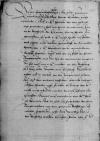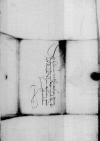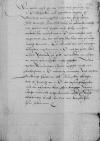Den ersamen und namhaftigen herren ⌊burgermeistern und rathmannen der koniglichen stad Dantzke⌋, / unsern besondern, guten freundenn.
Unsern freuntlichen grus und alles guts zuvorann. / Ersame und namhafftige herren, besondere, guthe freunde. /
Aus Ewer Erbarkeit ⌊⌋, das uns gestrigs tags gewordenn, / hab wir gerne vornommen, / das unser ⌊⌋ den ersamen zweien herren ⌊burgermeistern⌋ zu gutt Ewer Erbarkeit nicht haben misfallen, / und weren auch vordan gutwilligk an die andern ⌊herren⌋ / von Ewer Erbarkeit benuhmet / unser commendacion brieffe zugeben. / Weil aber der auszugk der herren ⌊burgermeister⌋ / und der tag der comparicion ungewis, die zeit auch, / wie Ewer Erbarkeit melden, / vor dem ⌊reichstage⌋ fast kurtz fellet, / doneben auch ⌊furstliche durchlauchtigkeit⌋ uff ir vorbitt von der ⌊jungen und altenn koniglichen maiestet⌋ kein antwort erhalten, / bedunckt uns mit solchem schreiben nicht zu eilen / bissolange, das koniglicher wille muge erkundet werden, / dornach sich wirt sein zurichten. / Dieweil auch vortrostung von koniglichem hoffe ist kommen, / das die zeitt sich zugestellen den hern ⌊burgermeistern⌋ / vor dem ⌊gemeinen reichstage⌋ solt werden zugelassen, / acht wirs unnottig, das sie den reichstag dorfften besuchen. / Kuem aber ⌊furstliche durchlaucht⌋ mitler zeit von ⌊koniglicher maiestet⌋ bescheidt, / (: der nicht anders, dan kurtz vor dem ⌊reichstage⌋ kommen mag :) das sie uff denselbten solten erscheinen, / so were abermals durch furstliche durchlaucht zu bitten, / das nach gehaltenem tage / zeit und gewisse stelle wurd ange[s]etzt, / domit fueglicher weis die hern ⌊burgermeister⌋ der comparicion mochten gnug thun. / Worinne wir auch zu solchem unserm bedencken Ewer Erbarkeit und den herren ⌊burgermeistern⌋ gefellig mugen sein und zu willen, / sein wir erbottig, / dan denselbten Ewer Erbarkeit zum bestenn, die wir gotlichen gnaden bevelhen, / viel liebs und nutzlichs wolgefallens zufurdern / und wirglich zubeweisen / sein wir unbeschwert und geflissenn. /
Datum aus unserm schlos ⌊Heylsbergk⌋, den vierdenn Novembris M D XLIII. /
⌊Joannes⌋, von Gottes gnaden bischoff zu ⌊Ermlanndt⌋ /
Wir haben negst vor das freuntlich gemuet / von Ewer Erbarkeit geschickten, uff gehaltener ⌊tagfart⌋ zu ⌊Graudentz⌋ / uns angezeigt, / was den zugesagtenn stur belanget, / freuntlich durch sie gedanckt, / welchs wir hiemit auch zuthun nicht haben mugenn underlassen. / Und ist uns Ewer Erbarkeit freuntlicheit vill angenemer, / dan ein vil grossers, das uns zu nutze mochte kommen. / Es soll auch, / wie wir alwegen befunden, / worinne wir Ewer Erbarkeit und der guten ⌊stadt⌋, unserm vaterland, zu gutt / vil werden vormugen, / an unser gutwilligkeit nichts abgehen. / Was unsern unmundigen ⌊ohmen⌋ angehet, / wolle wir unbeschwert Ewer Erbarkeit antworts erwarten / und unserm landtvogt, heuptman uff ⌊Braunsberg⌋, bevelhen, / das er imants an Ewer Erbarkeit, der den schulmeister mit der absagung kont, / thue fertigenn, / domit solcher mutwille undernommen werde etc. Diese beigebunden brieffe sein uns von koniglichem hove zukommen etc.



